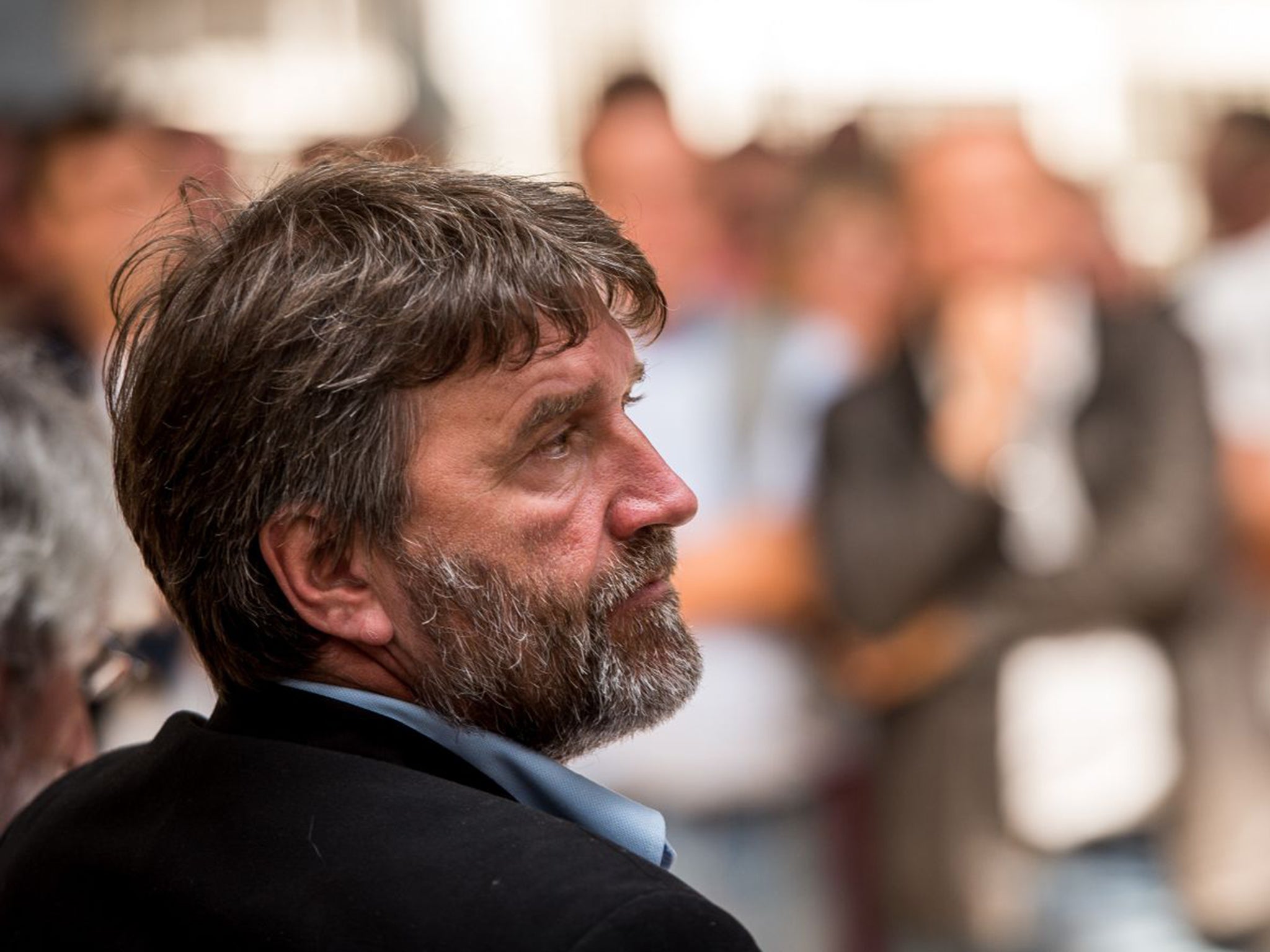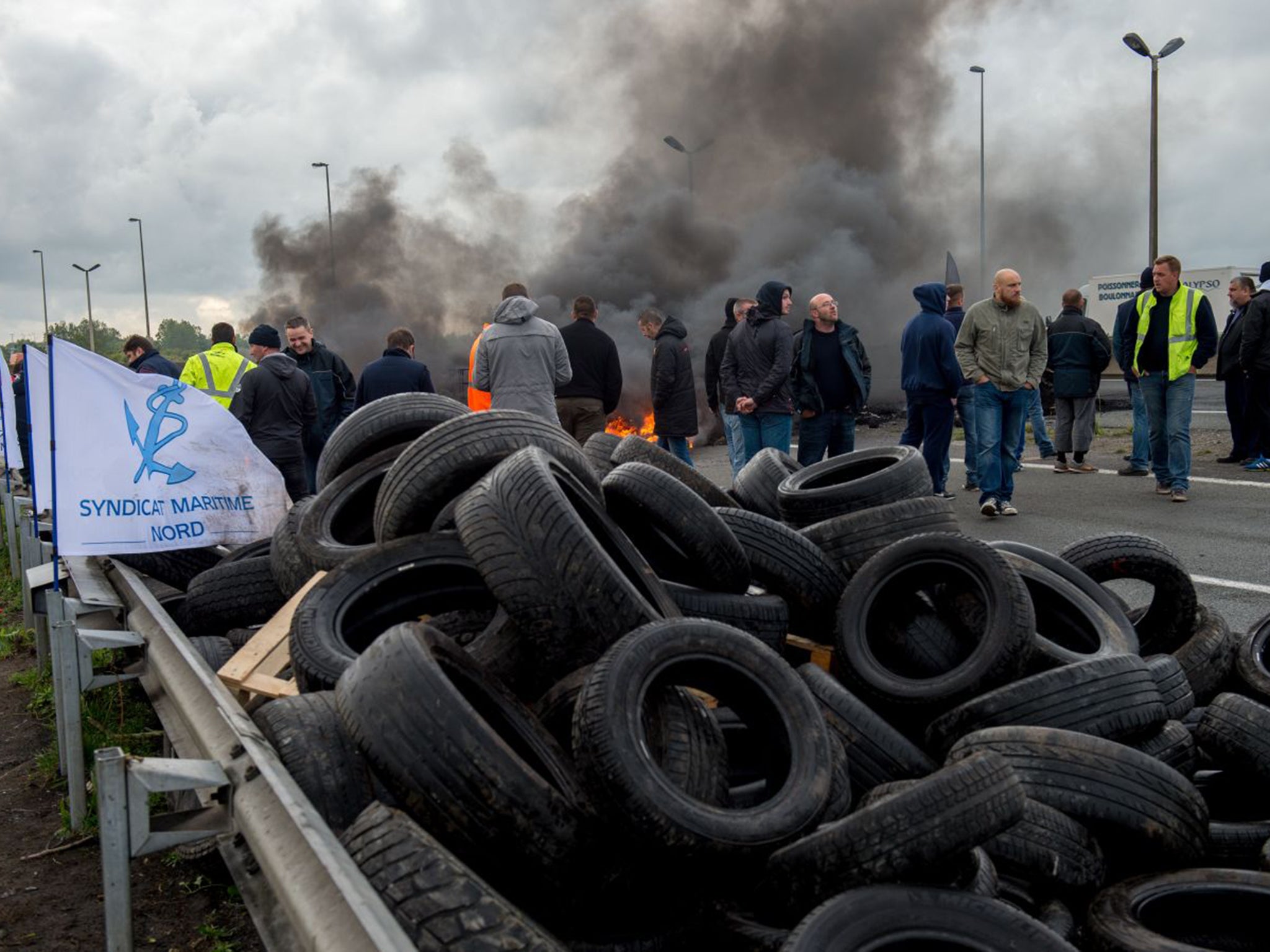Eric Vercoutre: The controversial Calais union leader who has divided opinion while causing major cross-Channel disruption
Vercoutre has two convictions for violence in the course of his union activities

He is the bearded face and the strident voice of the dispute that threatens to cause recurrent misery for cross-Channel travellers this summer. To his followers, Eric Vercoutre is a courageous guerrilla fighter against big business and the British and French governments. To his enemies, however, he is an old-fashioned union gang boss – a reincarnation of the aggressive docklands trades-unionism portrayed in the movie On the Waterfront.
Mr Vercoutre, 53, is the leader of a small seamen’s union in Calais, Le Syndicat Maritime Nord. He is the coach of a local football team, AS Marck, and a local property owner. He has two convictions for violence in the course of his union activities in recent years. In one case he was found guilty of beating up a policewoman whom he mistook for a press photographer. He was given an eight-month suspended prison sentence.
In 2012, he was ejected from the French CFDT union federation for activities incompatible with its values. In 2013, he was formally accused by investigating magistrates of fraud in connection with the demise of Sea France – the French ferry operator on the Dover-Calais route.

The criminal investigation is still in progress. Mr Vercoutre insists that he is the victim of “lies” concocted to undermine his work as a union leader.
It was Mr Vercoutre who organised the blockade of the port of Calais this week, for the second time in a month. It was Mr Vercoutre who led the flying picket of strikers who barricaded the rail entrance to the Channel Tunnel with flaming tyres on Tuesday. He boasted that he had beaten the supposedly impregnable tunnel security “wearing my flip-flops”.
It was Mr Vercoutre who warned last month of a “hot summer of much disruption” in Calais. It was Mr Vercoutre who threatened this week that his 600 members were ready to “block everything” indefinitely on the world’s busiest short sea crossing (Channel Tunnel included).
The protests have been suspended until Tuesday. Mr Vercoutre has warned that the blockades will resume and continue all summer if he does not get his way.
He wants the French and British governments to intervene to save a workers’ co-operative which he helped to set up in 2012 from the flotsam of the collapse of Sea France. His critics, including the French government’s Court of Auditors, say that this commercial shipwreck was partly his fault.
In its final years, it was alleged in a 2009 Court of Auditors report, the Sea France ferry company, nominally run by the French railways, SNCF, was actually run by the local branch of the CFDT seamen’s union and its works council, run by Mr Vercoutre. According to the report, the kitchens and duty-free shops were systematically pillaged by ferry workers. The ships were vastly overstaffed by crews hired by the union – many of whom were relatives of union officials; and many of whom never turned up.
Journalists and other union officials who investigated or complained about these alleged practices rcceived abusive or menacing, unsigned letters. In 2012, after it reported on the allegations, local paper Nord Littoral received a message which said: “You will be shaved and displayed in public like dogs, like the women who prostituted themselves with the enemy [during the war].”
Local and national media reported that Sea France employees who opposed the domination of the local CFDT branch were beaten up or had their cars vandalised. Mr Vercoutre and other union bosses angrily denied any part in any of these threats and denied any illegal activities, and no charges were brought.
In 2013, a criminal investigation led to Mr Vercoutre and two fellow union leaders being placed under formal investigation for fraud. Mr Vercoutre was also accused of “forgery and using forgeries”.
His lawyer said at the time that he was the victim of a conspiracy because of his union work. Formal charges have not yet been brought but the case remains open.
In 2012, mismanagement and overstaffing had led to the collapse of Sea France. The three former Sea France ferries were bought cheaply by Eurotunnel, with the agreement of the then government of Nicolas Sarkozy.
Mr Vercoutre and another local union leader, Didier Cappelle, were ejected by the CFDT union federation. They formed a local union of their own. They persuaded many – not all – of the Sea France workers to put their redundancy money into a workers’ co-operative which would operate the three ships.
This joint operation, MyFerryLink, has been a relative success – recapturing 12 per cent of the Calais-Dover ferry traffic. The crews worked much more efficiently as a co-operative.
Last month, however, the French-owned Eurotunnel pulled out of the partnership, announcing the lease and future sale of the two most modern ferries to its cross-Channel rival DFDS. The third ship would be converted to a freighter. At least 300 of the 600 jobs at MyFerryLink would be lost.
The timing of this decision was puzzling. Eurotunnel and MyFerryLink had fought a long legal battle to keep the new service going. P&O, the biggest Dover-Calais operator, and the UK competition authorities repeatedly objected to Eurotunnel controlling a ferry company.

MyFerryLink appeared finally to have won that legal battle just before Eurotunnel scuttled its own operation. Officially the tunnel company pulled out because it feared further legal actions. In truth, say insiders, it was because it was fed up with working with the union leaders, Mr Cappelle and Mr Vercoutre, who constantly interfered and quarrelled with the professional managers.
“The real cause of Eurotunnel’s departure was the internal crisis [in MyFerryLink],” a tunnel company official told Le Monde. “Jacques Gounon [the head of Eurotunnel] didn’t want to work with Didier Cappelle and his men any more.”
Mr Cappelle and Mr Vercoutre were alleged by the Court of Auditors to have played a big part in Sea France’s demise. They are also alleged to be partly responsible for capsizing its successor, MyFerryLink.
Early last month Mr Cappelle died following a heart attack. Mr Vercoutre has since become the undisputed leader of the ex-Sea France co-operative and the local union. He has the backing of most of the 600 co-operative members. Other local union officials are scathing about his record and handling of the dispute.
“We went down to Paris to see the Transport Minister and almost immediately Vercoutre started screaming at him that he was ‘useless’ and a ‘crook’. That didn’t help us much,” an official of another Calais union branch who asked not to be named, told The Independent. “Vercoutre can no longer see things in perspective. He has everything to lose and therefore nothing to lose. If MyFerryLink goes, Vercoutre’s union goes. His behaviour risks losing the 300 jobs surviving that we were promised.”
Calls to Mr Vercoutre and the Syndicat Maritime Nord were not returned.
Join our commenting forum
Join thought-provoking conversations, follow other Independent readers and see their replies
Comments
Bookmark popover
Removed from bookmarks